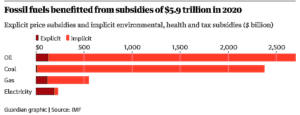Fossil Fuels Rule & Ruin
The Paris Agreement is a legally binding international treaty on Climate Change, adopted by 196 Countries and ratified at COP 21 in Paris on 12 December 2015.
Fast forward COP 26 (Nov. 2021), and these same participating countries are now returning to the table to do the hard work of determining how individual countries, and groups of countries working together, will fulfill their pledges to cut fossil fuel emissions — in UN speak, Nationally Determined Contributions or NDCs. There will be several attendees from Hawaii joining the conference in Glascow, Scotland, including Rep. Nicole Lowen, (State) House Chair, Committee on Energy and Environmental Protection.
COP 26 next month (with the United States now back in the Paris Agreement), will be an especially important event in terms of timing. America’s president and administration has welcomed science back (after a brief dark period in American policy) to have a seat at the table in guiding America’s priorities and further enabling the Paris Agreement climate goals.
In fact, a lot a has changed in the past 6 years since the Paris Agreement. For one, increasing global awareness as to human-induced Climate Change, no longer a legitimate debate topic, as a new climate reality is now demonstrating just how real climate change impacts have become a daily part of our lives — real and significant by any measurement. Even County’s like Russia and Saudi Arabia, regardless of the depth of their economic and political ties to fossil fuels, are not exempt from the social, environmental, and economic damage of a run away climate fueled by unprecedented rises in CO2 emissions and based on an unsustainable and obsolete global dirty energy economy.
BeyondKona is no stranger to Climate reporting, it makes up a core component of our publication. We believe that recent events and the forthcoming COP26 global summit are sufficient justification for this special October edition dedicated to a Climate Change threat now affecting more than 85% of the world’s population, and most other life on Earth.
In this special Climate edition, we invited you to also visit the following special report attachments:
Fossil fuels received $5.9 trillion worldwide subsidies last year
A 2016 in depth study jointly performed by the World Bank and IMF revealed what many people already suspected, the fossil fuel stakeholders are the most heavily taxpayer subsidized industrial sector in the world, to the turn of $5.4 trillion USD annually.
Not included in the 2016 IMF/World Bank study, but acknowledged, was the study’s omission of externality costs on society (health costs, deaths) and the damage to the global environment from an industry sector whose costs to world begin at extraction, but do not end at the tailpipe and smokestack.
Five years later, the IMF return to the public discussion of fossil fuel subsidies in a 2021 study finding that the public subsidization of the world’s most unsustainable industry, from polluter profits to human, environmental, climate costs was now, in annualized terms, equal to $11,000,000 USD every minute.
Yes, that right, $11 million USD a minute, or to put it another way, $183,333 per second in free money, taxpayer dollars that is, to the world’s most toxic industry.

The following Guardian article, published Oct. 6th, explores the trillions of dollars a year governments are adding to fuel to the fire of a human-induced global climate crisis, while at the same time, chasing solutions to halt a climate crisis so great it now threatens the very future of humankind and livability of planet Earth.
Fossil fuel industry gets subsidies of $11m a minute, IMF finds
from The Guardian, published Oct 6th, 2021
The fossil fuel industry benefits from subsidies of $11m every minute, according to analysis by the International Monetary Fund.
The IMF found the production and burning of coal, oil and gas was subsidized by $5.9tn in 2020, with not a single country pricing all its fuels sufficiently to reflect their full supply and environmental costs. Experts said the subsidies were “adding fuel to the fire” of the climate crisis, at a time when rapid reductions in carbon emissions were urgently needed.
Explicit subsidies that cut fuel prices accounted for 8% of the total and tax breaks another 6%. The biggest factors were failing to make polluters pay for the deaths and poor health caused by air pollution (42%) and for the heatwaves and other impacts of global heating (29%).
Setting fossil fuel prices that reflect their true cost would cut global CO2 emissions by over a third, the IMF analysts said. This would be a big step towards meeting the internationally agreed 1.5C target. Keeping this target within reach is a key goal of the UN Cop26 climate summit in November.
Agreeing rules for carbon markets, which enable the proper pricing of pollution, is another Cop26 goal. “Fossil fuel price reform could not be timelier,” the IMF researchers said. The ending of fossil fuel subsidies would also prevent nearly a million deaths a year from dirty air and raise trillions of dollars for governments, they said.
“There would be enormous benefits from reform, so there’s an enormous amount at stake,” said Ian Parry, the lead author of the IMF report. “Some countries are reluctant to raise energy prices because they think it will harm the poor. But holding down fossil fuel prices is a highly inefficient way to help the poor, because most of the benefits accrue to wealthier households. It would be better to target resources towards helping poor and vulnerable people directly.”
With 50 countries committed to net zero emissions by mid-century and more than 60 carbon pricing schemes around the world, there are some encouraging signs, Parry said: “But we’re still just scratching the surface really, and there’s an awful long way to go.”
The G20 agreed in 2009 to phase out “inefficient” fossil fuel subsidies and in 2016, the G7 set a deadline of 2025, but little progress has been made. In July, a report showed that the G20 countries had subsidised fossil fuels by trillions of dollars since 2015, the year the Paris climate deal was reached.
“To stabilise global temperatures we must urgently move away from fossil fuels instead of adding fuel to the fire,” said Mike Coffin, senior analyst at the thinktank Carbon Tracker. “It’s critical that governments stop propping up an industry that is in decline, and look to accelerate the low-carbon energy transition, and our future, instead.
“As host of Cop26, the UK government could play an important global leadership role by ending all subsidies for fossil fuels, as well as halting new North Sea licensing rounds,” he said. The International Energy Agency (IEA) said in May that the development of new oil and gas fields must stop this year to meet climate goals.
The comprehensive IMF report found that prices were at least 50% below their true costs for 99% of coal, 52% of diesel and 47% of natural gas in 2020. Five countries were responsible for two-thirds of the subsidies: China, the US, Russia, India and Japan. Without action, subsidies will rise to $6.4tn in 2025, the IMF said.
Proper pricing for fossil fuels would cut emissions by, for example, encouraging electricity generators to switch from coal to renewable energy and making electric cars an even cheaper option for motorists. International cooperation is important, Parry said, to allay fears that countries could lose competitiveness if their fossil fuel prices were higher.
“The IMF report is a sobering reading, pointing to one of the major defects of the global economy,” said Maria Pastukhova, at the thinktank e3g. “The IEA’s net-zero roadmap projects that $5tn is necessary by 2030 to put the world on the pathway to a climate-safe world. It is maddening to realize the much-needed change could start happening now, if not for governments’ entanglement with the fossil fuels industry in so many major economies.”
“Fossil fuel subsidies have been a major stumbling block in the G20 process for years,” she said. “Now all eyes are on the G20 leaders’ summit in late October.”
Ipek Gençsü, at the Overseas Development Institute, said: “[Subsidy reform] requires support for vulnerable consumers who will be impacted by rising costs, as well for workers in industries which simply have to shut down. It also requires information campaigns, showing how the savings will be redistributed to society in the form of healthcare, education and other social services. Many people oppose subsidy reform because they see it solely as governments taking something away, and not giving back.”
The G20 countries emit almost 80% of global greenhouse gases. More than 600 global companies in the We Mean Business coalition, including Unilever, Ikea, Aviva, Siemens and Volvo Cars, recently urged G20 leaders to end fossil fuel subsidies by 2025.




Leave a Reply
Join the Community discussion now - your email address will not be published, remains secure and confidential. Mahalo.